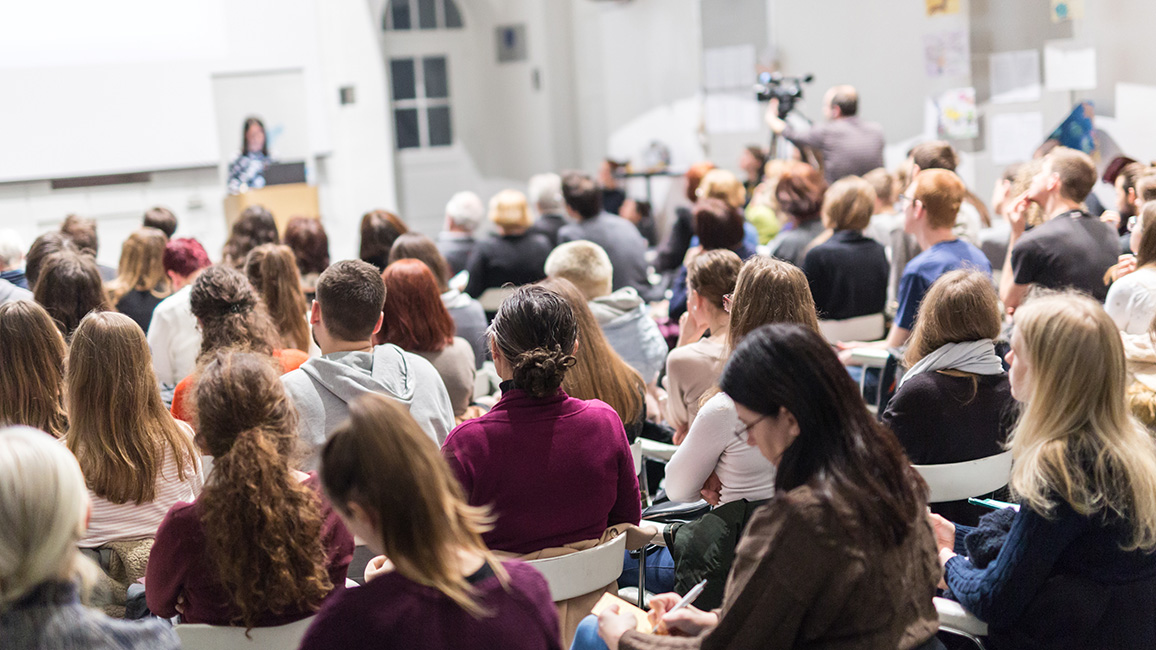Käte Hamburger Centres offer humanities scholars and social scientists the opportunity to conduct research on topics of their choice together with outstanding national and international academics, free from the many obligations of everyday academic life. The centres invite researchers from all over the world, known as fellows, to spend up to twelve months in Germany.
By exchanging ideas with other cultures of knowledge, it is possible to scrutinise one's own assumptions and gain new perspectives. Innovative approaches are used to further develop comparative cultural research and methods in the humanities. The Centres open up a space for interdisciplinary research, often also with small subjects, on new, innovative issues. In this way, the research groups not only achieve excellent research results, but also contribute to the internationalisation of the humanities at universities in Germany and strengthen links with foreign institutions and academic cultures. The Käte Hamburger Centres funding line was evaluated as excellent in 2017.
The Federal Ministry of Research, Technology and Space (BMFTR) is therefore continuing this successful model with the announcement on the funding of the Käte Hamburger International Centres (Federal Gazette of April 1, 2019). The BMFTR is reacting to current developments: In addition to "classical International Centres", funding under funding line II can now also be provided for those who are pursuing a transdisciplinary study in the area of cooperation between the humanities and the life sciences, the natural sciences, technology and engineering, for example, on cultures of research or on global challenges such as climate change.
Käte Hamburger International Centres (funding guideline 2019):
Käte Hamburger Centre for Apocalyptic and Post-Apocalyptic Studies
Käte Hamburger Centre: "Cultures of Research”
Käte Hamburger Centre: "Dis:connectivity in Processes of Globalisation”
Käte Hamburger Centre: "Legal Unity and Plurality”
Käte Hamburger Centre „Heritage in Transformation“
Käte Hamburger Centre "Cultural practices of reparation"
The Käte Hamburger Centre for Apocalyptic and Post-Apocalyptic Studies investigates systemic change and collapse in societies, individuals and environments of the past and present, as well as future concepts for the time after collapse. The transdisciplinary research group brings together the apocalypse as a figure of thought and discourse tradition in the humanities with social and natural science approaches that focus on empirically observable changes in social and/or natural systems. The Centre thus contributes to current debates on social and ecological collapses and future concepts.
Board of Directors:
Prof. Dr Robert Folger, Ruprecht-Karls-Universität Heidelberg
Website
The Käte Hamburger Centre for Advanced Study in the Humanities "Cultures of Research" is dedicated to the diverse research cultures of the sciences and humanities, their similarities, differences and transformations. The interdisciplinary discourse focuses on the question of how the orientation of the sciences towards complex systems and their social challenges such as climate change, energy transition, biologisation and sustainability is changing research and how this is increasing the epistemic and participatory complexity of research.
Board of Directors:
Prof. Dr Gabriele Gramelsberger, Prof. Dr Stefan Böschen, RWTH Aachen University
Website
The Käte Hamburger Centre for Advanced Study in the Humanities "Dis:connectivity in Processes of Globalisation" examines historical and contemporary processes of globalisation. Focusing on the concept of dis:connectivity, the Centre rethinks the current understanding of globalisation as an unstoppable intensification of global consolidation and networking and, in contrast, emphasises the mutually dependent, tense relationship between global interdependence, lack of connection and disentanglement.
Board of Directors:
Prof. Dr Roland Wenzlhuemer, Prof. Dr Christopher Balme, Prof. Dr Burcu Dogramaci, Ludwig-Maximilians-Universität Munich
Website
The Käte Hamburger Centre for Advanced Study in the Humanities "Unity and Diversity in Law" examines phenomena of the unresolved simultaneity of unity and diversity in law from a historical perspective: according to the thesis, legal diversity is not a sign of "defective law" or non-functioning legal practice, but rather a supra-temporal and supra-regional structural feature of law per se. The Centre aims to open up the connection between unity and diversity in law in a new way and to put it up for discussion as an analytical approach to various phenomena of coexistence.
Board of Directors:
Prof. Dr Ulrike Ludwig, Westfälische Wilhelms-Universität Münster
Website
The Käte Hamburger Centre for Advanced Study in the Humanities "Heritage in Transformation" (InHerit) is developing a new, transdisciplinary and practice-oriented form of heritage studies that focuses on humanities perspectives on global social upheaval processes. The Centre addresses central questions of our time - about identity and difference, belonging and ownership or the relationship between history, present and future. Last but not least, it addresses the question of what role cultural heritage and natural heritage and their interactions can play in the future shaping of social and transcultural relationships.
Directorate: Prof. Dr Eva Ehninger, Prof. Dr Sharon Macdonald, Humboldt-Universität zu Berlin
Website
The research group is dedicated to analysing cultural practices of reparation from a historical, transnational and transmedial perspective. "History" focuses on memory cultures and historical-political discourses, "Experience" on individual experiences of loss and damage and "Nature" on cultural-ecological issues. With its research, the research group aims to make a contribution to the reorientation of cultural studies and create knowledge about individual and collective reparation processes in a globalised world, which is fundamental for future coexistence.
Board of Directors:
Prof. Dr Christiane Solte-Gresser, Prof. Dr Markus Messling, Saarland University
Website
Former Käte Hamburger Colleges
Between 2007 and 2011, an international panel of experts selected a total of ten further “Käte Hamburger Centres” on the following topics:
KHK Duisburg-Essen: Centre for Global Cooperation Research
KHK Jena: Imre Kertész Kolleg Jena: Eastern Europe in the Twentieth Century
KHK Bonn: Law as Culture
KHK HU Berlin: Work and Human Life Cycle in Global History
KHK Munich: Rachel Carson Center for Environment and Society
KHK Erlangen-Nuremberg: Fate, Freedom, and Prognostication. Strategies for Coping with the Future in East Asia and Europe
KHK Bochum: Dynamics in the History of Religions
KHK Weimar: International Centre for Cultural Skills Research and Media Philosophy
KHK FU Berlin: Interweaving Performance Cultures
KHK Cologne: Morphomata. Genesis, Dynamics and Mediality of Cultural Figurations


